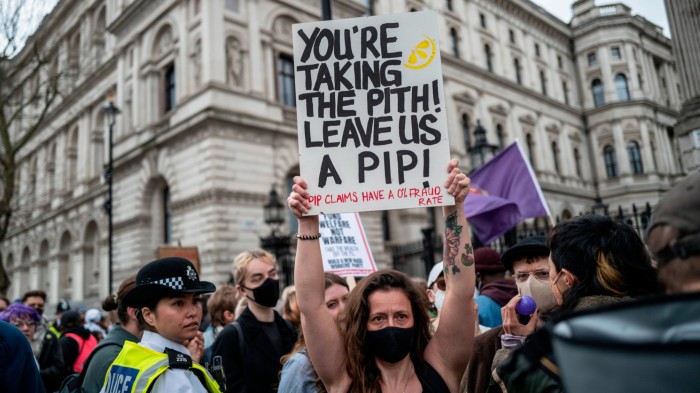A leading charity has accused ministers of trying to play down the extent to which benefits cuts will increase poverty, claiming official forecasts rely on a “sleight of hand” to underestimate the true impact.
A quarter of a million people, including 50,000 children, will be pushed into poverty as a result of welfare reforms, according to an impact assessment that the UK government published alongside chancellor Rachel Reeves’ Spring Statement on Wednesday.
But the Joseph Rowntree Foundation said this was an underestimate, because the overall figure included a supposed reduction in poverty due to the cancellation of reforms planned by the previous Conservative government.
The impact assessment said that “not taking forward the previous government’s changes” would benefit 370,000 people by an average of £2,600 a year. This was factored into the overall estimate for a net rise in relative poverty of 250,000.
The JRF argued that since these changes never went ahead the true impact would be higher, with the charity’s chief analyst, Peter Matejic, estimating the rise in people in relative poverty would be at least 350,000.
The Treasury said the poverty assessment was “of all the measures scored in the Spring Statement, which includes not going ahead with the previous government’s Work Capability Assessment measures”.
“It is right that this is included in the overall poverty analysis. To suggest otherwise is misleading,” the Treasury added.
The Office for Budget Responsibility had kept the savings flowing from the Conservatives’ intended reforms in its fiscal forecasts in October, because the government said then it would bring forward its own reforms making savings at least as big.
The government also estimates that about 800,000 people will lose out on disability benefits, also known as personal independence payments (Pips), with individuals set to lose an average of £4,500 a year by 2029-30.
The estimates are likely to stir further discontent among Labour MPs, many of whom are already angry about the government cutting the welfare and aid budgets while raising defence spending.
Last week, work and pensions secretary Liz Kendall unveiled a package of sweeping welfare reforms that included tightening eligibility for Pips and slashing the highest rate of incapacity benefit in half.
However, her announcement did not include the government’s impact assessment that shows how many people will be affected by the measures.
Those figures show about 370,000 people who are in receipt of disability benefits will no longer get them when they are reassessed. Close to half a million future claimants will no longer be entitled to them as well, it added.
Meanwhile, around 2.25mn people currently in receipt of incapacity benefits, known as universal credit health, will be impacted by the freeze on rates, losing on average £500 a year.
Additionally, 750,000 future recipients of the benefit will lose out on about £3,000 a year because of the government’s decision to slash the benefit entitlement in half for new claimants, it added.
Around a fifth of families with a disability in the household will lose out on benefits as a result of the reforms, averaging a loss of £1,730 per year, according to the analysis.
Relative poverty is defined as households whose income is below 60 per cent of the median level.
Prime Minister Sir Keir Starmer had hoped the changes announced last week would generate about £5bn in annual savings by the end of the forecast period, but the OBR has refused to “score” many of the proposed changes, claiming that the government had not provided sufficient detail about the policy proposals.
The tussle caused political disarray just hours before Reeves set out her Spring Statement.
Kendall was forced to find emergency additional cuts, including a freeze to the rate of incapacity benefits, leading to increased anger from MPs who had been reassured that the welfare reforms were not purely a cost-cutting drive.
“It all looks like a shambles,” said one person briefed on the statement’s preparations. “It has been pretty chaotic.”
“The last minute scramble to claw even more funds from the welfare budget has shattered any illusion of a moral case for cuts,” said Labour MP Neil Duncan-Jordan. “The policy will fuel the social determinants of poverty that ultimately create further pressure on the services the chancellor is trying to cut.”
Treasury chief secretary Darren Jones inflamed backbench frustration further on Wednesday when he compared the OBR’s costing of benefits cuts to him reducing his children’s pocket money while telling them to get a Saturday job.
The OBR on Wednesday estimated that the total package of measures on welfare will save just £3.4bn by 2029-30, after factoring in new spending on job support and the administration of the welfare system — although it stressed that its estimates were highly uncertain.
The fiscal watchdog said this figure includes a total £3bn cut to spending on incapacity benefits — from which it has deducted the £1.6bn that would have been saved by previous Conservative reforms that the current government has scrapped.
It also includes a reduction of £4.1bn in spending on disability benefits in England and Wales. Meanwhile, the more generous rate of jobless benefit will add £1.8bn to spending by 2029-30, before a small additional cost because more people are expected to claim.
However, the OBR said there was not enough details to assess whether the changes to financial incentives and job support will bring more sick and disabled people into work in the long term.
It noted, however, that the people concerned “generally have restricted capacity to work and may have been out of the labour market for some time”.
The government said its estimates of people pushed into poverty did not take into account its programmes to get people into work, which it expects would mitigate some of the financial losses.



